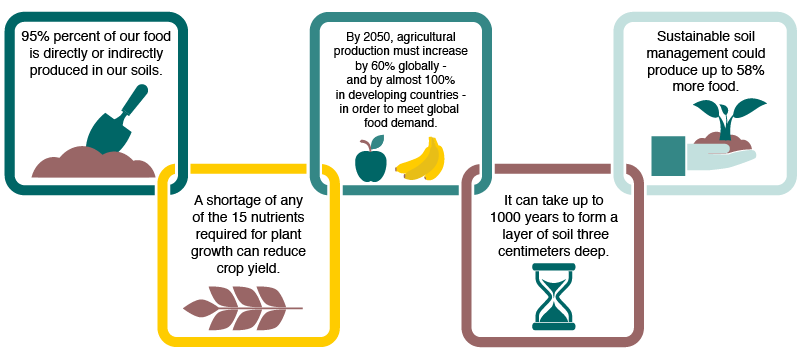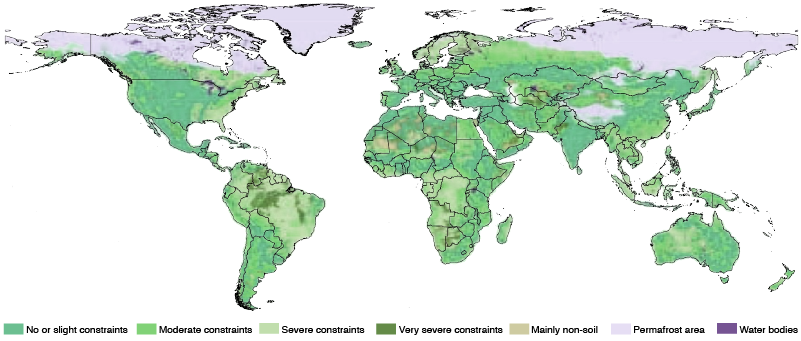The very land beneath our feet is an incredible, yet finite resource. Providing critical services to humanity, healthy soil is essential for agriculture, water, carbon sequestration as well as the incredible biodiversity that exists in the world today. The maintenance and enhancement of global soil resources are essential if humanity’s overarching need for food, water, and energy security is to be met. Soils are one of the fundamental bases of life. There’s no denying that the living ecosystem beneath our feet has a major stake in the history and future of Planet Earth.
The soil is utilized globally for biomass production, including agriculture and forestry, as well as for storing, filtering and transforming nutrients, substances, and water. In a thriving ecosystem, soil supports biodiversity and offers a source of raw materials for various species. Up to two billion microorganisms reside in a single teaspoon of soil, providing essential services such as the regulation of CO2, N2, O, and CH4 levels in the atmosphere, preventing desertification and easing global warming.
Due to humanity’s exploitation of the soil, this resource is in trouble. The United Nations Food and Agriculture Organization estimates that 33% of the soil is degraded through erosion, salinization, compaction, acidification, synthetic chemical pollution and nutrient depletion. 25 billion metric tons of topsoil is lost every year, leaving once arable farmlands completely unproductive. If current rates of degradation continue, all of the world’s topsoil could be gone within 60 years. This is a major concern as generating just three centimeters of topsoil takes well over 1,000 years.
.
Soil Health Key Facts
Source: Food and Agriculture Organization of The United Nations (2016)
.
This is especially problematic, as we need to increase food production by an estimated 70% if we are to feed the world’s growing population in 2050. Conventional agriculture is one of the major causes of soil degradation. 45 million km²of the Earth’s surface is already used to grow food, animal feed, fiber and fuel and 100,000 km² of cropland is degraded every year due to overgrazing, synthetic agrochemical overuse, and industrialization. These synthetic agrochemicals are composed of a wide range of materials, including heavy metals. Excess nitrogen and trace metals such as arsenic, cadmium, lead, and mercury can impair plant metabolism and cut crop productivity, ultimately compounding pressure on arable land. When they enter the food chain, such pollutants also pose a great risk to food security, water resources, rural livelihoods and human health. This contamination costs an estimated $10.6 trillion annually from lost productivity and environmental damages, not to mention the health care costs. If the situation is left to continue, we will risk producing 30% less food over the next 20 years.
New agricultural and conservation practices are of the upmost importance to human health and the structural integrity of the global food system. Healthy soil reduces the risk of floods as it can store as much as 3,750 tons of water per hectare – that’s one and a half Olympic swimming pools! The International Panel on Climate Change states that 89% of all agricultural emissions can be mitigated through the improvement of soil health. According to the UN FAO, healthy soils will also strengthen crop yields and increase the nutritional value of our food.
.
Nutrient Availability in Soils
.
The soil is a non-renewable asset that should be protected and conserved with care for generations to come. Conventional agriculture has hindered the natural processes that nourish crops and sequester carbon in cultivated lands. This is why we at Primal Group are shaping an agricultural system that protects and replenishes the soil while at the same time-saving billions of dollars on synthetic inputs, ultimately protecting the planet and our health. Neem is one of the most powerful solutions, used around the world as a natural pesticide that enriches the health and fertility of the soil.

